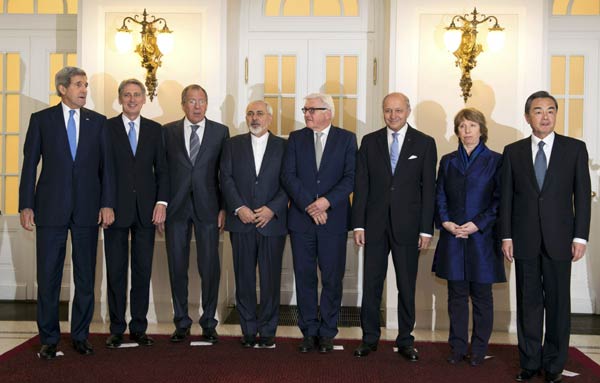Iran to turn uranium into reactor fuel under extended deal
Updated: 2014-12-02 10:06
(Agencies)
|
|||||||||||
 |
|
US Secretary of State John Kerry, Britain's Foreign Secretary Philip Hammond, Russian Foreign Minister Sergei Lavrov, Iranian Foreign Minister Javad Zarif, German Foreign Minister Frank-Walter Steinmeier, French Foreign Minister Laurent Fabius, EU High Representative Catherine Ashton, Chinese Foreign Minister Wang Yi (L-R) pose for a family picture during their meeting in Vienna November 24, 2014. [Photo/Agencies] |
VIENNA - Iran will convert more of its higher-grade enriched uranium into reactor fuel under an extended nuclear deal with world powers, making the material less suitable for building atomic bombs, a diplomatic source and a US think-tank said on Monday.
Iran and the United States, France, Germany, Britain, China, and Russia failed to meet a Nov. 24 deadline for resolving their dispute over Tehran's nuclear programme. They gave themselves until the end of June for further negotiations.
It was the second time this year they had missed a self-imposed target for a comprehensive agreement under which Iran would curb its nuclear programme in exchange for an end to sanctions hobbling Tehran's economy.
As a result, a preliminary accord reached in late 2013 will remain in force. Under its terms, Iran halted its most sensitive nuclear activity in return for limited easing of sanctions.
Accordingly, Iran earlier this year eliminated its stockpile of uranium gas enriched to a fissile concentration of 20 percent, a relatively short technical step away from weapons-grade material. A large part of it was processed into oxide.
When the deal was first extended in July, Iran undertook to move further away from potential weapons material by converting 25 kg of the uranium oxide - a quarter of the total - into nuclear fuel during the initial four-month extension.
The diplomatic source said that under the new extension Iran would continue this work and he suggested around 5 kg would be converted per month.
In line with this, a US-based research and advocacy group, the Arms Control Association, said 35 kg uranium oxide would be turned into fuel during the seven-month period. It said Iran had also made specific commitments limiting its development of advanced centrifuges to refine uranium.
In July, a US official said that once the oxide had been turned into fuel plates, Iran would "find it quite difficult and time-consuming" to use it in any effort to develop a bomb.
Iran denies seeking a nuclear weapons capability, saying its atomic energy programme is meant to generate electricity.
Related Stories
Iran's leader doesn't oppose more nuclear talks 2014-11-27 21:30
Russia, Iran mull signing of goods-for-oil agreement 2014-12-01 09:08
EU extends sanctions relief on Iran 2014-11-26 10:07
Iran nuclear talks 2014-11-26 08:13
Khamenei: west fails to bring iran to its knees 2014-11-26 07:38
Iran nuclear talks to be extended until July 2014-11-24 22:01
Today's Top News
Chinese consumers' online choices proliferate
CPC sends out inspectors in new round of anti-graft checks
Swiss voters reject gold, immigration proposals
Sarkozy wins French UMP party leadership
Ireland pushes EU drive against smoking
One-child allowances continue with second birth
Editorial: Get HKSAR back on track
Women still outnumbered in top jobs
Hot Topics
Lunar probe , China growth forecasts, Emission rules get tougher, China seen through 'colored lens', International board,
Editor's Picks

|

|

|

|

|

|





